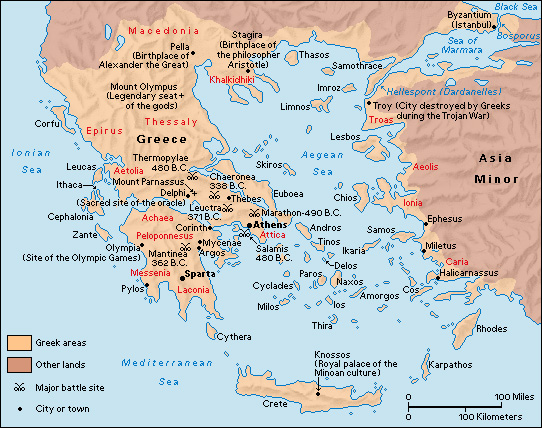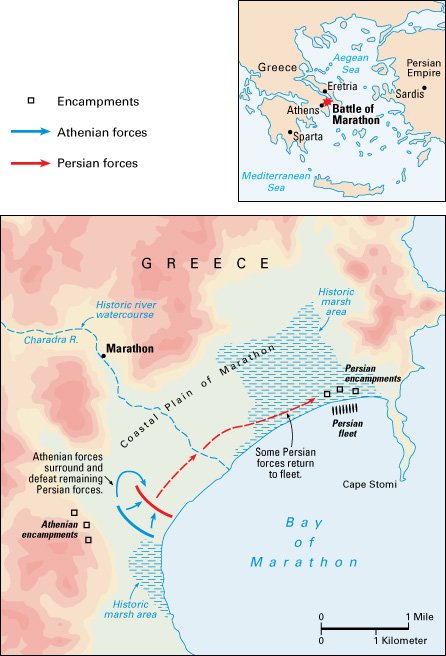Marathon << MAIR uh thon >>, Battle of, was one of the most important battles in the history of Western civilization. Marathon is a coastal plain in Greece about 25 miles (40 kilometers) northeast of Athens. In 490 B.C., a Greek army defeated an invading army of Persians at Marathon and stopped Greece from becoming part of the Persian Empire.

Causes of the battle.
In 507 B.C., the Athenians asked King Darius I of Persia to become their ally against Sparta, a powerful city-state in southern Greece. To form the alliance, representatives of Athens promised Athenian obedience to Darius. The Athenian government later rejected the agreement, but Darius continued to consider himself the rightful ruler of Athens.
Beginning in 499 B.C., Greeks living under Persian rule in Asia Minor (now part of Turkey) rebelled against Darius. The Athenians sent soldiers and 20 ships to aid the rebels. Then the Greek forces attacked and burned Sardis, a city that served as Darius’s capital in Asia Minor. Darius vowed that he would take revenge on the Athenians by conquering and burning Athens.
The battle.
In 490 B.C., Darius sent his nephew Artaphernes and Datis, one of his generals, with an army and a fleet of about 200 ships to conquer Athens. The Persians first destroyed Eretria, a city on the Greek island of Euboea, and then sailed for Marathon. The Athenian general Miltiades positioned the Athenian troops on the inland edge of the plain. The Persians occupied the seaward edge. Both armies waited several days. The Persians awaited a signal that Athenians allied to them had weakened Athens by starting a civil war in the city. Meanwhile, the Athenian army waited for expected help from Sparta. But only about 600 soldiers from Plataea, a city near Athens, joined the Athenians at Marathon.

A few days later, the Persian leaders, hoping that civil war had broken out in Athens, loaded part of their forces on ships. The Persians on the ships prepared to sail to Athens and attack the city. Seeing their chance for a victory, the Athenians charged the army of Persians that remained on the plain. The Greeks surrounded and thoroughly defeated the Persians at Marathon.
The Persians, not worried about the defeat at Marathon, sailed for Athens. They reached Phaleron, Athens’s harbor, a few days later. There, the Persians found that civil war had not broken out. They also learned that the Athenian army at Marathon had reached Athens before the Persian ships did. As a result, the Persians returned to Persia.
According to tradition, Miltiades sent the runner Pheidippides from Marathon to Athens with news of the Athenian victory. Pheidippides raced the 25 miles (40 kilometers) to Athens at top speed, delivered his message, and fell to the ground, dead. Today, the word marathon refers to a foot race of 26 miles 385 yards (42.2 kilometers) or of similar length.
